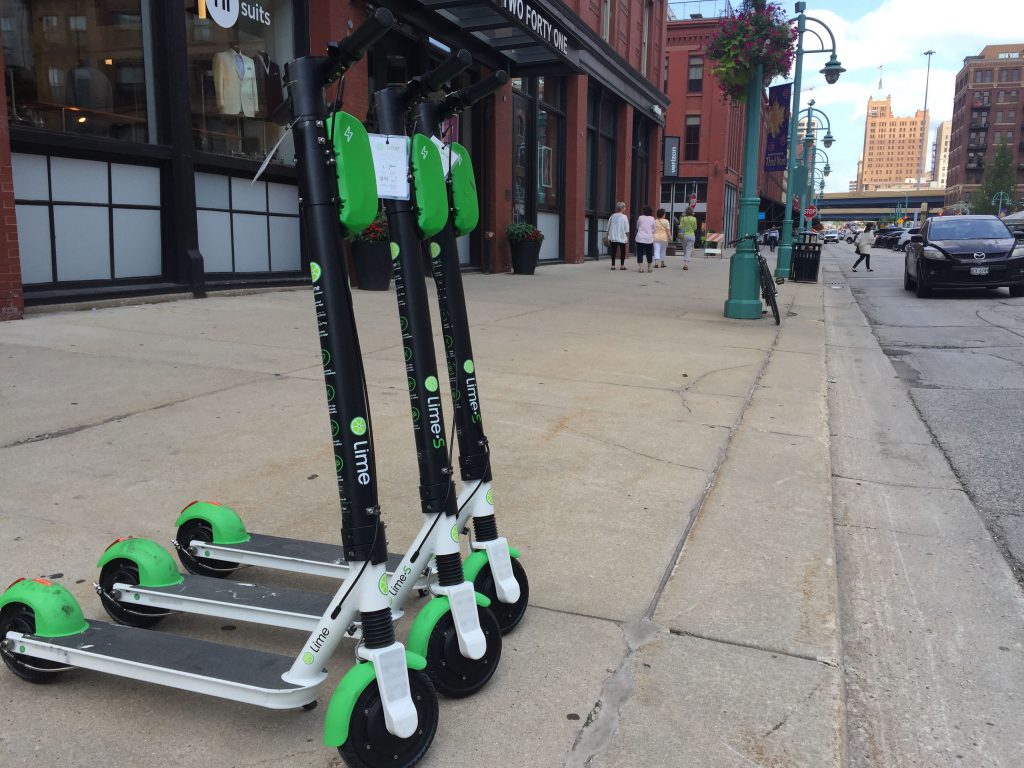Scooters Hit Milwaukee Streets
First wave arrives as Lime, Bird and Spin each deploy their scooters.
The scooters are back.
The first wave of dockless, electric scooters were spotted on Milwaukee streets Tuesday morning. The rentable scooters, accessible on a per-minute basis with a smartphone application, are provided by three private companies under a city pilot study.
The companies rely on a network of independent contractors to charge the scooters overnight while having a small staff in each market.
Milwaukee first allowed the scooter companies to legally operate on city streets in 2019. A total of 350,130 rides were taken that year, with the three participating companies reporting 67 crashes and 141 citizen complaints submitted to the city. An average of 3.6 riders per vehicle per day were taken. A Department of Public Works survey conducted at the end of 2019 generated 7,658 responses.
The new pilot program allows each company to deploy up to 1,000 scooters across the city, but with a limit of 100 scooters each in the downtown area (Zone 1). The city is divided into seven zones.
“A major goal of this is to try to get more scooter usage into the neighborhoods,” said Public Works Commissioner Jeff Polenske in April. In addition to the Zone 1 deployment cap, the five zones bordering Downtown would each need to have a balanced number of scooters deployed.
Under state law, the scooters are to be limited to traveling no faster than 15 miles per hour.
Parking is required to be on sidewalks that are more than five feet wide. The companies, using geo-fencing technology, are required to not allow scooters to be parked in Lakeshore State Park, the Milwaukee RiverWalk and other designated areas. The vehicles automatically turn off when entering a prohibited area.
DPW estimates that fees from the study could bring in as much as $350,000. A $25-per-scooter fee and $0.15-per-trip fee would be collected by the city. An additional $10 per scooter will be imposed so the city can hire a consultant. And revenues from the program could be used to upgrade city infrastructure used by the scooters, including bike lanes.
The resulting cost to the user, charged on a per-minute basis, is often slightly more than a bus ride but less than a trip with Uber or Lyft.
The new study will have a consultant execute monitoring of specific intersections. If more than 10% of a company’s given scooters are found to be used on the sidewalks during those monitoring periods the company would be barred from offering rides in that zone (if it is Zone 1) or required to initiate remedial actions (for the outer zones). Since their initial deployment, the scooter companies have rolled out new sidewalk-riding detection and deterrence features.
After the December 31st study’s conclusion, the city could adopt a permanent licensing structure or implement yet another study.
Transportation
-
Congestion Pricing Cuts Air Pollution in New York City
 Dec 14th, 2025 by Jeff Wood
Dec 14th, 2025 by Jeff Wood
-
FTA Tells Milwaukee to Crack Down on Fare Evasion — Even Where Fares Don’t Exist
 Dec 12th, 2025 by Graham Kilmer
Dec 12th, 2025 by Graham Kilmer
-
Will GOGO’s Bus Service Ever Get Going?
 Dec 9th, 2025 by Jeramey Jannene
Dec 9th, 2025 by Jeramey Jannene






















